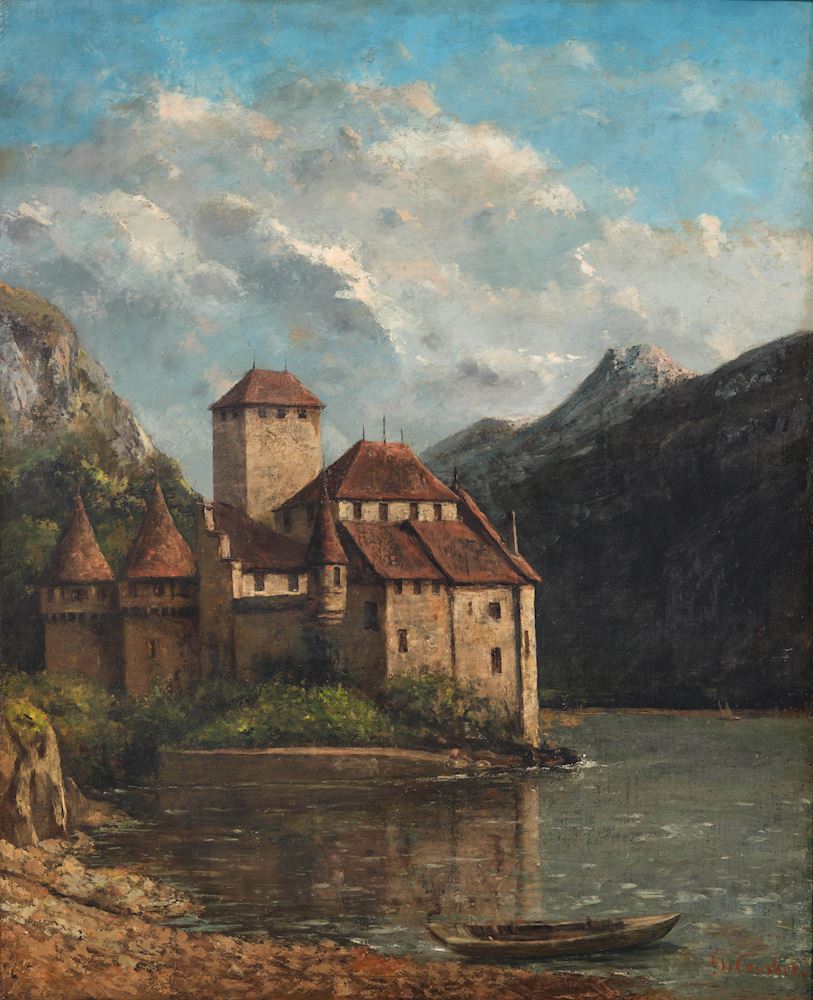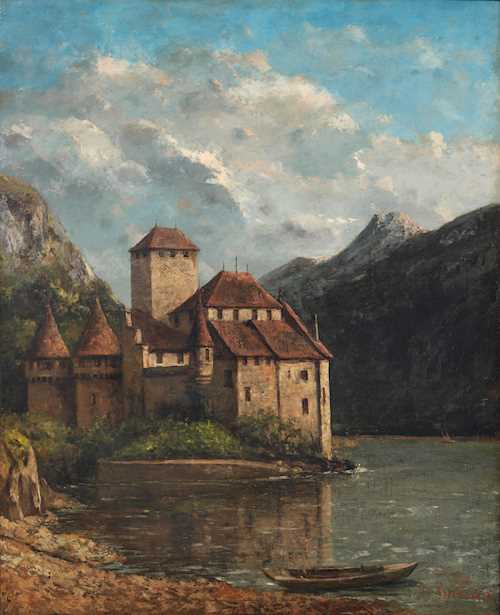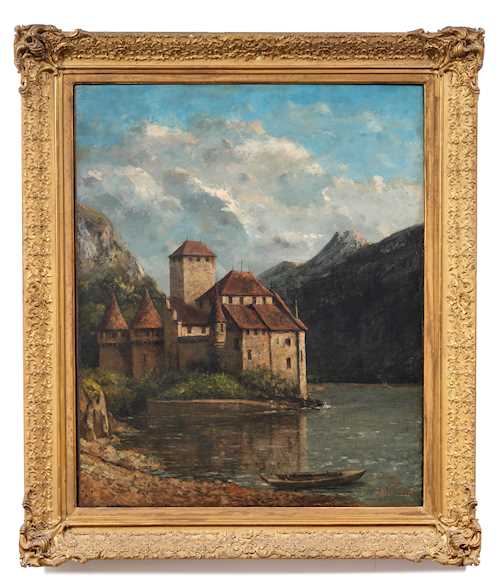
Lot 3223 - A206 19th Century Paintings - Friday, 22. September 2023, 04.00 PM
GUSTAVE COURBET
(Ornans 1819–1877 La Tour-de-Peilz)
Château de Chillon.
Oil on canvas.
Signed lower right: G. Courbet.
100 × 81.2 cm.
Certificate:
Comité Courbet, 12.3.2023.
Provenance:
- Flamarion collection, Paris (label verso).
- Private collection, Lugano-Castagnola, 1988.
- By descent, private collection, Switzerland.
Exhibited:
Tenero 1988, Cherubino Patá 1827–1899. L’ombra di Gustave Courbet, Galleria Matasci Tenero, 27.3.-15.5.1988, no. 45.
Literature:
Exh.cat. Cherubino Patá - L’ombra di Gustave Courbet, ed. Galleria Matasci, Tenero 1988, p. 170, no. 45 (as a work by Courbet and Pata, due to appear in the third volume of the catalogue raisonné being prepared at the time, which was not completed).
During the Paris Commune in the beginning of the 1870s, Gustave Courbet came increasingly into conflict with the French government due to cultural policy decisions he helped to make in his roles as president of the Republican Art Commission as well as Paris city councillor. In addition to a six-month prison sentence (which he served), Courbet was also fined the exorbitant sum of over 300 000 francs, which finally forced him into exile in Switzerland in 1873. There Courbet spent most of his time near Lake Geneva and painted the famous Château de Chillon several times. The work offered here is an outstanding example of these depictions of the picturesque castle, one of the most beautiful in Switzerland.
Courbet skilfully incorporates the castle, majestically situated directly on the lake, in his composition in such a way that landscape and architecture are harmoniously united on the canvas. The lakeshore in the foreground repeats the colour of the fortified walls, and the reflection of the architecture in the water provides an additional link between construction and nature. The small boat in the foreground gives the viewer the impression of having just arrived on the shore.
The subject conveys tranquillity and grandeur, but also radiates a melancholy that suggests Courbet’s personal situation during his Swiss exile. Of central importance for the symbolism of the Château de Chillon in Courbet’s oeuvre is probably the well-known romantic poem ‘The Prisoner of Chillon’ by the Englishman Lord Byron. This poem recounts the incarceration of the freedom fighter François Bonivard, with whose fate Courbet possibly identified in exile. Thus, the painting offered here is not only a fine example of the artist’s painterly aesthetics, but at the same time also bears witness to Gustave Courbet’s eventful life.
The painting will be included in the catalogue raisonné currently being prepared, as a work by the hand of Gustave Courbet.
Comité Courbet, 12.3.2023.
Provenance:
- Flamarion collection, Paris (label verso).
- Private collection, Lugano-Castagnola, 1988.
- By descent, private collection, Switzerland.
Exhibited:
Tenero 1988, Cherubino Patá 1827–1899. L’ombra di Gustave Courbet, Galleria Matasci Tenero, 27.3.-15.5.1988, no. 45.
Literature:
Exh.cat. Cherubino Patá - L’ombra di Gustave Courbet, ed. Galleria Matasci, Tenero 1988, p. 170, no. 45 (as a work by Courbet and Pata, due to appear in the third volume of the catalogue raisonné being prepared at the time, which was not completed).
During the Paris Commune in the beginning of the 1870s, Gustave Courbet came increasingly into conflict with the French government due to cultural policy decisions he helped to make in his roles as president of the Republican Art Commission as well as Paris city councillor. In addition to a six-month prison sentence (which he served), Courbet was also fined the exorbitant sum of over 300 000 francs, which finally forced him into exile in Switzerland in 1873. There Courbet spent most of his time near Lake Geneva and painted the famous Château de Chillon several times. The work offered here is an outstanding example of these depictions of the picturesque castle, one of the most beautiful in Switzerland.
Courbet skilfully incorporates the castle, majestically situated directly on the lake, in his composition in such a way that landscape and architecture are harmoniously united on the canvas. The lakeshore in the foreground repeats the colour of the fortified walls, and the reflection of the architecture in the water provides an additional link between construction and nature. The small boat in the foreground gives the viewer the impression of having just arrived on the shore.
The subject conveys tranquillity and grandeur, but also radiates a melancholy that suggests Courbet’s personal situation during his Swiss exile. Of central importance for the symbolism of the Château de Chillon in Courbet’s oeuvre is probably the well-known romantic poem ‘The Prisoner of Chillon’ by the Englishman Lord Byron. This poem recounts the incarceration of the freedom fighter François Bonivard, with whose fate Courbet possibly identified in exile. Thus, the painting offered here is not only a fine example of the artist’s painterly aesthetics, but at the same time also bears witness to Gustave Courbet’s eventful life.
The painting will be included in the catalogue raisonné currently being prepared, as a work by the hand of Gustave Courbet.
CHF 40 000 / 60 000 | (€ 41 240 / 61 860)
Sold for CHF 62 500 (including buyer’s premium)
All information is subject to change.


